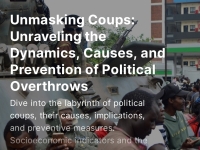News
Understanding the Dynamics and Implications of the Recent Coup in Niger
Commentary Excerpt
Recent Coup In Niger (Source: https://newsletter.arac-international.org)
ARAC International Strategic Communications -
Understanding the dynamics of political coups and their underlying causes is crucial in today's uncertain world. Our latest analysis on the recent coup in Niger may not come as a surprise if you've been keeping an eye on the data and indicators we frequently monitor. Dive into this thought-provoking piece for the Institute for Global Security Research & Analysis, as we unpack the complexities of coups and fragile states.
Commentary based on the recent events in Niger.
The recent coup in Niger has sent shockwaves across the region, and its repercussions are reverberating both domestically and internationally. As one of the latest incidents in a series of political upheavals, this event highlights the fragility of governance and political stability in the Sahel region. To grasp the dynamics and implications of this coup, it is imperative that we delve into the root causes and underlying factors that have contributed to the recurrent political unrest in the country.
Niger, like many other countries in West Africa, faces a multitude of challenges that have created an environment conducive to political instability. The complex interplay of issues - such as weak governance, corruption, socioeconomic disparities and ethnic tensions - has eroded public trust in state institutions, leaving the population vulnerable to extremist ideologies and power struggles. Understanding the motivations and actions of the coup leaders, as well as the grievances of the citizens that supported them, is vital in developing effective strategies to prevent such upheavals in the future.
The recent coup in Niger has sent shockwaves across the region, and its repercussions are reverberating both domestically and internationally. As one of the latest incidents in a series of political upheavals, this event highlights the fragility of governance and political stability in the Sahel region. To grasp the dynamics and implications of this coup, it is imperative that we delve into the root causes and underlying factors that have contributed to the recurrent political unrest in the country.
Niger, like many other countries in West Africa, faces a multitude of challenges that have created an environment conducive to political instability. The complex interplay of issues - such as weak governance, corruption, socioeconomic disparities and ethnic tensions - has eroded public trust in state institutions, leaving the population vulnerable to extremist ideologies and power struggles. Understanding the motivations and actions of the coup leaders, as well as the grievances of the citizens that supported them, is vital in developing effective strategies to prevent such upheavals in the future.
Moreover, the implications of the coup extend far beyond Niger's borders. The Sahel region has been grappling with a growing jihadist insurgency, and political upheavals like this can further exacerbate the security situation. The international community must closely monitor the developments in Niger, and the response of neighboring countries and regional organizations so as to prevent the spillover of violence and instability. Additionally, as Niger has been a pivotal partner for Western powers in the fight against extremism and irregular migration, this coup may disrupt the cooperation necessary for effective counterterrorism efforts.
The recent coup in Niger serves as a stark reminder of the fragility of political systems in the Sahel and the need for comprehensive efforts to address the root causes of instability. Understanding the dynamics and implications of such coups is crucial for crafting targeted interventions that promote good governance, socioeconomic development and peacebuilding initiatives. Only by comprehending the complexities of these events can the international community work together to create lasting solutions and foster stability in the region.
The recent coup in Niger serves as a stark reminder of the fragility of political systems in the Sahel and the need for comprehensive efforts to address the root causes of instability. Understanding the dynamics and implications of such coups is crucial for crafting targeted interventions that promote good governance, socioeconomic development and peacebuilding initiatives. Only by comprehending the complexities of these events can the international community work together to create lasting solutions and foster stability in the region.
For an in-depth analysis and comprehensive understanding of the root causes of political coups, subscribe to our free newsletter and gain access to the complete article.
ARAC International is a nonprofit research foundation advocating for Sustainable Development Goals (SDGs) to support peacebuilding, human rights, and global security. Help us in our mission to be a voice for marginalized communities in fragile regions needing humanitarian aid by subscribing at the link below.
https://newletter.arac-international.org
ARAC International is a nonprofit research foundation advocating for Sustainable Development Goals (SDGs) to support peacebuilding, human rights, and global security. Help us in our mission to be a voice for marginalized communities in fragile regions needing humanitarian aid by subscribing at the link below.
https://newletter.arac-international.org
more information: https://newsletter.arac-international.org
Liability for this article lies with the author, who also holds the copyright. Editorial content from USPA may be quoted on other websites as long as the quote comprises no more than 5% of the entire text, is marked as such and the source is named (via hyperlink).






